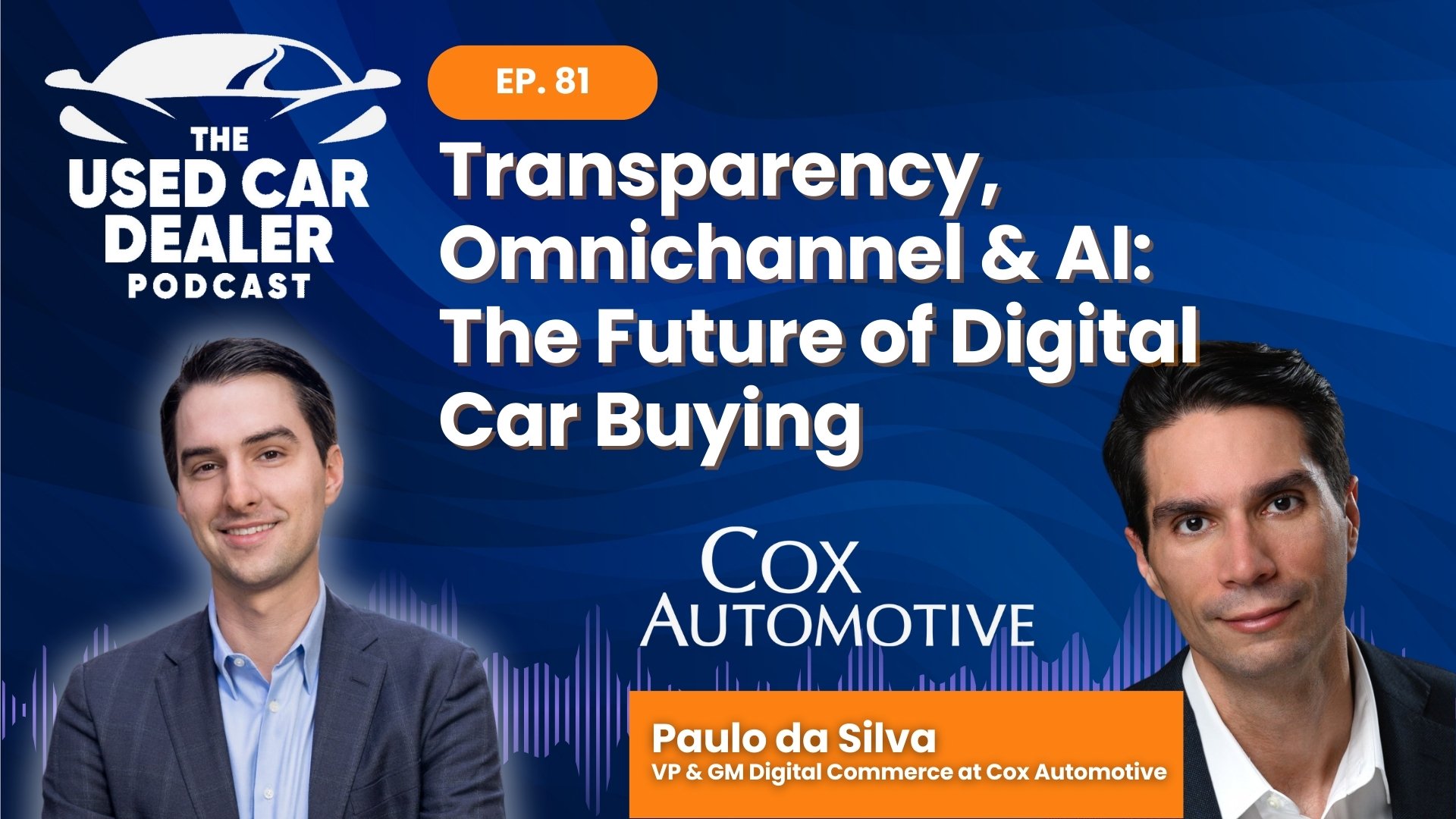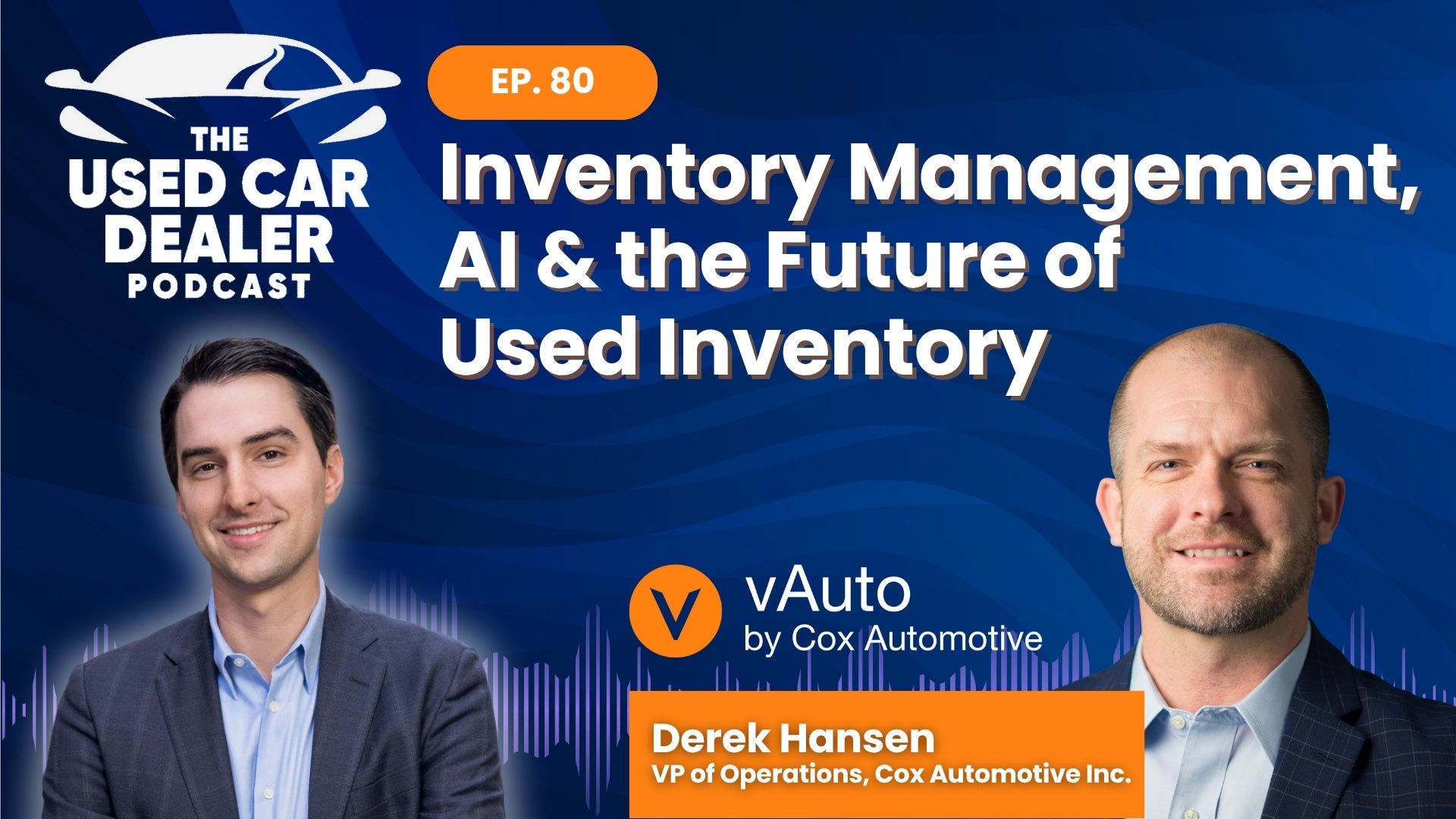In this transcribed episode of the Used Car Dealer Podcast, Zach Klempf is joined by Ross Tinkham, Go-To-Market Leader at Podium, and Alex Lawrence, CEO of EV Auto, a leading EV-only independent dealership and Podium customer.
Fresh off the buzz of post-NIADA conversations around AI, Zach explores how artificial intelligence is transforming communication, sales, and service in the independent dealer space. Ross shares how Podium’s AI-driven BDC solutions are enhancing lead engagement and operational efficiency, while Alex gives a boots-on-the-ground perspective from running a fast-growing used EV dealership—and how his team uses AI to handle everything from acquisition to service.
Whether you're skeptical about AI or looking to take your dealership to the next level, this episode dives deep into the future of customer engagement, digital retail, and EV-specific dealership strategy.
Zach: Zach here and another episode of the Used Car Dealer Podcast post-NIADA where the whole entire conference was abuzz, all about AI and today I'm joined by Ross Tinkham, the go to market leader at Podium, and Alex Lawrence, the CEO of EV Auto, which is a Podium dealership customer.
Zach: So Ross brings extensive experience in leveraging AI to enhance dealership communications, while Alex has had tremendous success in the used EV dealership space. So together they offer unique insights into how AI is reshaping customer engagement and sales in the auto industry. So guys, thanks for joining me on the podcast today.
Ross: Thanks for having us.
Alex: Yeah, thanks Zach. I appreciate it.
Zach: So to kind of kick things off, I'll start with you, Ross. Can you share your journey into the automotive tech industry and a little bit about your role at Podium for the audience?
Ross: Sure, absolutely. So, yeah, I entered the automotive industry about 10 years ago, coming up on just about a decade. And that was actually when I first joined Podium, so that was my first experience in the business, on the vendor side, working with dealers, but spent a lot of time working with dealers, dealership groups, did a lot on, on like a partnership level for a period of time, and today I lead our automotive sales organization, and it's a ton of fun and like the industry's at a really exciting point, lots of good things happening, lots of changes, twists and turns, so it's definitely been an interesting journey.
Zach: And for Alex, talk to me about what inspired you to transition from academia to founding EV Auto focusing exclusively on used EVs.
Alex: Yeah, no, I still teach. I'm a tenured professor. I teach one class called Sales and AI Technology, and I teach that in the fall and the spring, and then I teach another sales class in the fall and the spring. So I haven't quit teaching yet. It's a challenge to manage both. But, you know, for me, it wasn't a transition. I'm an entrepreneur first, college second. You know, I'm just turning 51, and so before I was a college professor, I'd already done 25 years as an entrepreneur, and I'm fortunate the university supports me still doing that. And so for me, it's two parallel tracks that I travel on. But I've always been an early adopter, for as long as I can remember the latest gadget or video game or app or website has always been really fascinating to me.
And so, you know, my early experience with ChatGPT in December of 2022—I had a visceral reaction to the product, both from a business perspective and as a college professor. I started using it in my classes, having my students use it in January, which was quite controversial at the time. It landed me on the front page of The Wall Street Journal with my picture and I was live on CNN debating this law professor on the value of it in the classroom. And so I've obviously also been using it very, very early on in my business as well.
Zach: And how did both of your paths cross? What led to the collaboration between Alex, your dealership, EV Auto using Podium?
Alex: Yeah, so like I said, I'm testing out all kinds of products, and a couple years ago there weren't as many as there are now. You know, I love other Utah companies, but not enough to choose them just because of that. Podium's headquarters and my business are in the same state, so I had certainly an awareness of them, but I'd never been a customer. I didn't have a business that made sense for Podium to be used. And so when it came time for me to look at tools like this, they were a natural candidate. During that process, they emerged as the best product. And that’s totally unbiased, unpaid. I was a paying customer for a while before I became an ambassador or whatever you want to call it, and I was only willing to do that because I'm a paying customer. I'm not available for rent nor for sale in some cases. So yeah, the product was great, and it's gotten better and better, and they're awesome to work with. I mean, they're really a pleasure to work with. And I'm fortunate I get to kind of push the envelope a little. I think, Ross, we’ve done some things where I was an early beta tester, and I really relished that role. I really like giving product feedback—good, bad, and ugly—and yeah, so it's been a gradual change in our relationship.
Zach: And Alex is kind of the main use case with Podium, the lead nurturing aspect—making sure regardless of what hour of the day it is that someone is managing that lead, whether it's sales or even other opportunities like trade-ins, etc.
Alex: Yeah, and the product's got a lot more powerful since I started using it, so it can do a lot more. And you know, I just opened up my first dealership that has a service center, so we're training the AI to start working with that. Historically, we've used it for inbound sales support during business hours. And so, you know, as techy as I am, our dealership is built around that personal experience and personal interaction—especially with EVs, people have tons of questions. During business hours, we certainly utilize Podium for more than just the AI but the phone system, the payments, and the Google reviews. That's part of the reason I love the product— it does so many things well.
But, you know, we certainly have times where we can't answer our phones and we can't respond to all messages in a timely manner. So I actually hired a full-time person that manages our Podium. Part of the reason we’re very fortunate is our social media has grown dramatically, and so the number of inbound leads for us has exponentially multiplied, and it’s gotten overwhelming.
During business hours, we've got the AI tool we call Amy that's well-trained and doing her thing, in addition to Heather who’s our human, and, of course, some of our sales people as well. And then after hours, we’ve got different options. We've got a voice generative AI tool I built for voice calls, and then Podium handles all after-hours and closed-hour text-based interactions.
Zach: Ross, I have a kind of follow-up to some of what Alex is mentioning. In your own words, how does Podium’s AI BDC integrate with existing dealership systems to enhance customer communication?
Ross: Yeah, great question. There are really two points of integration when it comes to lead engagement. One, pretty much any dealer we work with is using a CRM and all those leads flow into the CRM. With certain systems, we integrate to pull those leads into our platform for our AI to work, engage, and drive the conversation.
Ross: The other integration is writing data back from Podium into the dealer’s CRM. So it’s pushing leads into Podium and pulling data back into the CRM. On the independent side, smaller operations often use Podium for a lot of the tasks you’d normally use a CRM for, like lead communication and phone systems. We support any channel a customer wants to engage—text, web chat, phone—and then the dealer might use their CRM at the desk to finalize deals.
We don't integrate with every single CRM the same way—it depends on vendor APIs and data availability—but many dealers use Podium as their front-end communication and their CRM for the back end.
Zach: And Alex, digging deeper—what changes or tweaks did you make to existing workflows when implementing Podium’s AI technology?
Alex: Turning it on is easy; getting it set up and going is straightforward. The product’s ability to train the AI has gotten much better. In the early beta days, we spent a ton of time training the AI not just on answering questions but on answering in our unique voice—We’re very casual, laid back, relaxed. I don’t want aggressive follow-up or pushy test-drive scheduling. That’s very different from many of Podium’s other customers.
There’s a learning curve, but it’s improved over time. For example, we have an acquisitions business that buys cars from private-party sellers, and we trained the AI to ask those questions differently than for sales. The learning curve now is much smoother than when I first started a year and a half ago.
So the onboarding is easy—especially if you’re a standard dealer—but EV-only dealers are rare, and I’m not from the car business, so I refused to do some common lead-nurturing tactics. Out of the box, Podium fits most dealers better than it did me, but it’s gotten much easier over time. I was painful at first—software development is iterative, and we learned together. Now for anything new, it’s plug-and-play, and my lead manager was surprised: “It’s doing great—pretty darn good—and it’s only been a few weeks.”
Ross: Can I add a couple thoughts on that track?
Zach: Sure.
Ross: I talk with dealers about AI solutions in the market—not just Podium—buying advice, questions to ask, expectations. I’d frame it this way: out of the box, you’re getting a B or B-minus level product, which is generally good. To push it to an A, that requires partnership and investment from the dealer—you define how you want to answer questions. You fine-tune for the first 60–90 days by reviewing conversations, celebrating wins, and correcting misfires. Seek a customizable product but walk in knowing it takes some investment to get it perfect. The great news: once you get it there, you don’t have to do it again.
Zach: Totally agree.
Zach: Ross, another follow-up: how does Podium ensure AI-driven communications are personalized and human-like? What’s under the hood for that?
Ross: Great question. Any AI solution is only as good as the data you feed it. We connect to dealer data sources—inventory feeds, website APIs—to present accurate info. Beyond data, our secret sauce is focusing on human-like engagement rather than a bot-like experience. We engineer emotional intelligence into the agent: detecting sentiment, responding with empathy, modulating tone. We deploy engineering resources to build the most conversational, human-like AI agent in the market—no small feat, but that’s where we prioritize our effort.
Zach: And with digital retail on the rise, how are customer expectations evolving and how does AI address these changes?
Ross: Digital retail exploded post-COVID. Dealers weave DR tools into processes—some find success, others struggle. As consumers, we expect personalized, frictionless, immediate responses. If I hit your website with a question, I want a quick, tailored answer. AI shines there. While we don’t offer full DR, we integrate with DR platforms: based on prompts, we route customers to in-person visits or into DR checkouts on your site. We help collect front-end data so by the time you dock them into DR, you already know what you need.
Zach: Alex, your thoughts on DR in the used EV market and other EV trends?
Alex: I’m a contrarian dealer. Look at Tesla: zero dealer interaction—make a few checks and hit purchase. They even drove a car off the factory lot on its own recently. Yet I do zero digital retailing. I want people to come in. 80–90% of my customers have never bought an EV—they have tons of questions. Our in-person experience is zero pressure, one person, no back-end finance ninja—just digital paperwork that gets you in and out in 20 minutes.
We’re building our reputation: “Stop by, ask questions, leave—no push.” That’s tough to replicate online. We sell a lot out of state via social media—FaceTime calls, recorded walkaround videos—more than photos. Other EV dealers live the same tension: Ford F-150 buyers are commodity—they prefer DR. EV buyers want human interaction. The market leader is total DR; the used folks I know double down on in-person like me.
Zach: What challenges did you face establishing a used-only EV dealership?
Alex: December will be six years since we started. We have two dealerships and a third opening this fall. EVs are the most volatile vehicles ever—Elon Musk tweets move your assets. Managing that fluctuating inventory takes diligence—that’s our competitive advantage: we do EVs exclusively. Gas cars on trade get wholesale’d immediately and that never changes.
A challenge turned opportunity: more dealers are chasing EVs, so competition for acquisition is fierce. We run a lean operation—low overhead, high volume. We optimize digital tools, processes—my background is tech, so rather than adding more heads, we optimize. That’s why many dealers have low single-digit margins. We use tech everywhere, except for that personal in-person experience unique to EVs.
Zach: Ross, what upcoming features or innovations is Podium developing?
Ross: We’ve focused on optimizing our sales AI agent; still work to do there. The natural next step is service. The service side is ripe: missed calls, engagement challenges, high volume. We’re rolling out a service offering this quarter with voice AI at its core. Service appointment scheduling has high abandonment, long hold times—voice AI can handle real-time conversational scheduling with human-like nuance. We’ll beta it this quarter and ramp to market in the back half of the year.
Zach: Alex, any expansion plans or exciting 2025 news for EV Auto?
Alex: We’re opening our third dealership in Nashville. Our day-one plan was to become the world’s largest seller and servicer of used EVs. We have an offer on a fourth, ideas for fifth, sixth, seventh. We just added a four-bay EV-only service center—it’s extremely busy with zero advertising. We run mobile service with Cybertruck trailers in Denver and St. George, and one in Orange County. We’re vertically integrating all things EV—so accelerator to the floor through year-end.
Zach: Quick question on EV service vs. standard service?
Alex: EVs need low service—they have few moving parts, few fluids—but they still need tires, brakes, cabin filters, 12V batteries, cameras, control arms, air conditioning units—these wear out. EV parts last longer than ICE, but they still wear. Service margins are labor heavy, and EV service labor yields good margins. EV owners think their cars are special and avoid Jiffy Lube or legacy dealers with long waits. We fill the gap: EV-only, certified techs, top online reputation—highest rated dealership in Utah—so we draw a big service market.
Zach: How do you both envision the future of AI in automotive retail over the next few years? Ross?
Ross: We're really just getting started. At NIADA, I polled the room and a third of hands went up for AI solutions tried—so many haven’t stepped in or got burned early. The adoption curve will climb; soon non-AI dealers will be rare. Functionality and use cases will expand. Specialized AI agents—lead engagement, service engagement—will multiply. You’ll see startups solving niche problems and major players building specialized agents for every dealership task. It’s fascinating to watch in the next 6–12 months.
Zach: Alex?
Alex: Depends on timeframe. In three years, a dealer could choose phone and text AI indistinguishable from a human employee—calls and texts that reply exactly how you’d want at near-perfect rates for follow-up, inbound, outbound. Beyond that, self-driving car delivery like Tesla’s will expand. AI tools will handle acquisition—private-party buys, financial strategy, deep analysis—unlocking opportunities humans can but maybe lack resources to pursue. Costs will drop as competition grows. AI will touch every dealership corner, even robots in service bays over a decade.
Zach: Last, rapid fire—favorite EV model?
Alex: Cybertruck.
Ross: Same—Cybertruck. It’s polarizing, unique, great daily driver with FSD, four-wheel steering, steer-by-wire, massive visibility, super quiet, comfortable, bed utility.
Zach: One word to describe future of automotive retail?
Alex: Innovation.
Ross: Continued innovation—operational excellence to whole new levels.
Zach: Most exciting tech trend?
Alex: All things AI.
Ross: Generative voice AI—pilots are hitting B/B+ now, huge scale opportunity inbound/outbound.
Zach: Thanks Ross and Alex—this was an AI 101 crash course. Thanks for joining!
Ross & Alex: Thanks Zach, it was fun!
For More about Podium Visit - https://www.podium.com/industry/used-auto?utm_medium=third_party_-_podcast&utm_source=used_car_dealer_podcast&utm_campaign=25q3-noram-car_dealership-third_party_media-ucdp_w/_alex_lawrence-july&utm_term=prospecting&SCID=701UL00000PfzM6YAJ

.jpg)
.png)




.jpg)
.jpg)
.jpg)
.jpg)

.png)
.png)
